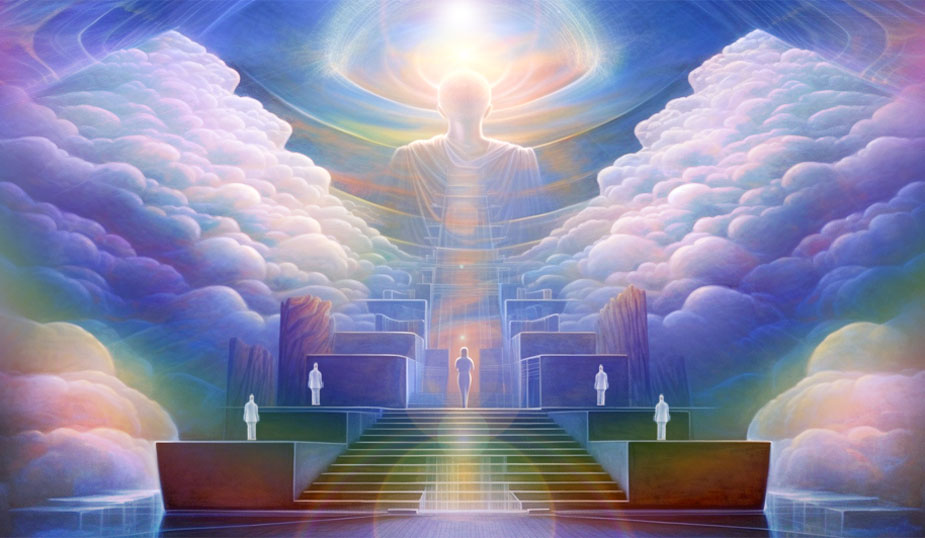Evolving Personalities Life After Life
 by by Dr. H. Spencer Lewis
by by Dr. H. Spencer Lewis
It would appear from what has been said in the foregoing pages that since man evolves a distinctly different or modified personality in each earthly incarnation, these personalities, being an attribute of the soul, would give to each individual on earth an aggregation of the personalities previously evolved.
In other words, if the soul upon entrance into the physical body at birth carries with it any remnant of the personality or personalities possessed by it through previous incarnations, each one of us would possess at the present time in the present incarnation an aggregation of personalities rather than a single one.
The truth of the matter is that each one of us manifests primarily in each incarnation only one personality, and that one is that which is being evolved at the time; but this evolving personality is unquestionably an aggregation of the essential elements of the previous personalities possessed by the soul. Herein lies the only logical explanation for the commonplace manifestation of those complexes which psychoanalysis and psychiatry attempt to distinguish and separate into distinct traits or elements of character.
Merely as an hypothetical example, let us assume that we have before us for critical study a business man, 45 years of age, who has risen to his position from a family living in moderate circumstances and of average intellect. Let us assume that his schooling was derived exclusively in the public schools, with no college or special academic training, and that after entering the business world and contacting various occupations he finally entered the employ of a firm wherein diligent application, some special abilities, loyalty, and sincerity, enabled him to become promoted until at the age of 45 he reached the position of general manager, and is now a married man with two children, a fine home, a good income, a well-trained mind, with the advantages of some travel and much reading, and the benefits of culture and good social position to make the remainder of his life one of assured happiness and peace. And let us assume, in our study of him, that while he is not an extremist in religious thought he is a supporter of the church and of every humanitarian, religious activity, is fond of healthy outdoor sports, is conservative and dignified in his personal habits and language, steady and logical in his thinking, reasoning, and general activities, and given to one or two hobbies for relaxation. In general, he is neither a special study for the psychoanalyst nor one to be cast aside as having no complexes of any kind. In other words he is just the average successful business man whose personality and character seem to have been softened by many experiences and whose life is not affected by any of the passing thrills or momentary excitements of the day; yet he has shown unique ability in a number of directions and holds a number of convictions in his mind which nothing can reverse or modify. To his intimate friends he has a personality that is distinct enough to be recognized and distinguished from others, yet there are a few elements of this personality which appear to be foreign to it or at least unexpected variations.
From the viewpoint of those who do not believe in reincarnation this man’s character and personality would be the result of his education, training, and experiences in the past 45 years of this one incarnation exclusively. In other words, his present personality would be solely that which has evolved during this one incarnation.
From one point of view this personality is a blending and an aggregation of the essential and outstanding elements of his character and personality in all of his previous incarnations. In other words, we will assume that this man in his last incarnation was essentially a soldier, for most of his life was devoted to army training and to military experiences plus a few lessons of life learned through separation from his family, through a lack of sufficient income to give him in the latter part of his life the luxuries that he would have enjoyed, and similar experiences. And we will assume that in the incarnation preceding that of a soldier he was essentially a physician, or one devoted to the study of diseases and the practice of any methods that would relieve diseases and physical suffering, and that through this training and experience he learned many serious lessons of life, which, before the close of his incarnation, left indelible convictions upon his memory as elements of his personality. And we will assume that in the incarnation preceding that of the physician he was a farmer in a provincial sense in some foreign country bordering the Mediterranean, and that, as such, he learned through experience many other lessons of life, especially those relating to agriculture, the conservation, of small funds, the benefits of diligent effort and watchfulness, the value of sacrifice, and the benefits of saving, as well as the detriments of the lack of education and the lack of opportunity to improve the mind and hand in practical application.
Without going back any further in possible incarnations preceding these, we will see now that upon each transition this man carried in his soul and personality certain keenly learned lessons, or extremely well-learned experiences, which constitute at the present time the foundation stones or principal elements of his character and personality. If we look upon these outstanding lessons of each incarnation as rules and guides of life, written down in a ledger as the immutable laws by which he would govern himself, he will find that as he passed through each incarnation and added to the character ledger of his life, he also added new rules, new laws, new convictions, new elements of personality.
When he passed from the life of a farmer, and through reincarnation became the physician, he entered into a new life with some of the outstanding lessons he had learned as a farmer written secretly but indelibly in the inner nature of his being; and as he passed through childhood and studied to become a physician these deeply buried elements of his previous personality subtly manifested themselves by acting as controls or guides, or modifying tendencies, in the situations which confronted him in his daily life. Perhaps as a physician he may often have wondered at his inner liking for agriculture. Perhaps he wondered, also, about his deep-seated tendency to be saving, economical, and conservative in his expenditures. Undoubtedly he would have no recollection of having acquired these principles through experiences in a previous life. As he learned more lessons through his profession as a physician, new rules were established and new elements of personality were adopted and the rough and uncouth elements of his life as a farmer were eliminated, and at the close of his incarnation as a physician his personality was that of a blending of the principal elements of both the farmer and the physician.
When he came into life again in another incarnation as the soldier, he probably found early in his youth that he had a liking for the study of the human body and desired to know more about the organs and functionings of parts of the body, while at the same time upon occasion there may have been an uprising in his consciousness of of knowledge as to what to do in emergencies or in accidents, or when his body or the body of someone else was in great suffering. All the while there may also have been a tendency to want to be out in the open country close to orchards, or to fields of wheat, or among grape vines, or where the farmers were at work. There may have been in his consciousness a desire to know something of herbal extracts and of chemistry, and it would have been said of him probably that he was a youth of strange nature or temperament and tastes in his lines of study. But after being entered into the army as a young man, and after developing an appreciation of military training and regulation, new features were added to his character and personality so that when the time came for transition again, many new and valuable lessons of life had become established in his personality as guides and laws.
Therefore, we would find that when this man came into life this time in his present incarnation his undeveloped personality consisted only of the deeply-seated and unawakened elements of personality in the past. Had there been any way of analyzing his past or scrutinizing the undeveloped personality residing within him as a boy of twelve or less we would have found that in the soul of his being his personality was like an unfinished book upon the pages of which were written certain laws and principles to become the fundamentals of his present personality. We would have found the love for the country, the admiration of nature’s processes, the instinct to save, and to economize, the ability to plant and make things grow, the desire for greater knowledge and more modem advantages, the liking for chemistry and botany, the sympathetic feeling toward those who suffer, with a natural ability to know what to do to relieve such suffering, the instinct to live properly so as to guard against disease, and, with all, an inherent love of country and a highly developed degree of patriotism, and an instinctive dread of ammunition, firearms, or physical conflicts. Out of this group of character elements, which the expert would call complexes, there developed gradually in the youth the natural desire to be engaged in some constructive, peaceful, conservative, modern, practical activity, which would entail no destruction of life, no sacrifice of personal needs, no lack of opportunity for education, and at the same time permit of the expression of sympathy and the desire to help those who suffer.
Understanding, then, what were the essential elements of his evolved personality and what were the fundamental laws of his character, we should not be surprised to find that as he passed from one occupation to another in his present incarnation he finally found satisfaction and contentment in the service of a company devoted to the making of proprietary remedies from herbal extracts for the alleviation of physical conditions. In other words, we find him now as general manager of a company manufacturing and selling bottled extracts which are used by physicians and chemists in the preparation of remedies for physical suffering. In this business he found opportunity to be in sympathy with all of the instincts of his nature and to express all of the complexities of his personality. He not only found happiness in his work but an unusual degree of efficiency and expertness in his activity.
We would also understand from our study of his past why it is that in his present incarnation he had some “peculiar” whims or fancies, as his friends called them, and why he used to love to get away from the busy city life, with all of its tinsel and noise and rapid activities, and go out into the country and go among the orchards and the fields of growing things to ponder over the wonders of nature. We would also know why he loved to hear military music, loved to see the soldiers on parade, but had an inherent and well-fixed conviction that war was a brutal and unnecessary thing. And we would understand why, in his wealth and assured position of steady financial income he still gave expression to some strange instinct of husbandry and insisted upon buying large supplies of essential foods and storing them in store rooms of his home, regardless of the fact that in these modem days all these supplies could be quickly purchased at nearby stores. These and many other traits of personality which seem to be inconsistent to that of a modern, conservative, business man would be called complexes by the student of character, and would be classified as peculiarities by relatives and friends.
Thus, this hypothetical man would be, today, the aggregation of his previous personalities. In his normal convictions he would exemplify those principles which had become convictions in character through bitter lessons of the past. In his ethical standards he would practice those things which he had learned were the best of policies and principles. The weaknesses which this man might evince would represent tendencies which had not been modified by previous experience, and were, therefore, unaffected by lessons which had brought convictions and established principles. These weaknesses he would indulge in until by experience he had learned of their value or of their detriment in his life. In this way he would learn either to modify them or eliminate them so that by the close of his life these weaknesses would be overcome, or, if found pleasurable and non-injurious, would be continued as desirable elements of character for the future.
Each one of us is, in the same manner, an aggregation of our past personalities. In this life we draw upon the great lessons and experiences of the past and express them as the fundamental elements of our present character, while at the same time, learning through lessons and experiences, new principles and new elements out of which we decorate and modify, shade, blemish or improve, the beauty of our character. This is the purpose of reincarnation. By its principles we are enabled to taste all of the cup of life and to learn all of its lessons. By our own will we overcome those things which are evil, eliminate those things which are detrimental, strengthen those things which are good, and thus perfect our ego and bring us close to the Divine consciousness and the image of God.
In no other way can the human personality develop and evolve in one span of life on earth, even though it be of a hundred years. One span of life would be insufficient and inadequate in the time element alone to permit of the development, evolution, and perfection of a personality; and aside from the time element there are also the elements of human contact, environment, geographical location, varied occupation and the progressiveness of civilization. Those born this year and living only a hundred years in the present time and never having lived before, and never to live hereafter, could not possibly evolve and develop a perfect personality of universal knowledge, experience, and understanding, for they would have no appreciation of the past through which mam has developed and they would have no appreciation of the magnificent developments of the future. To claim, therefore, that each soul has but one short span of life on earth, and that this span, separate from all the experiences of the past with their very valuable lessons, and separated from the magnificent lessons to be learned in the future, and in contact with only one phase of humanity in one country in one age of time, constitutes all that is necessary for a man or woman to develop and perfect a human character is absurd and unsound, as well as unfair and unjust.
If we, as human beings, are to be judged later on by the development and attained perfection of our characters, and by that judgment condemned eternally to peace or unhappiness, joy or sorrow, rich reward or eternal condemnation, then it is manifestly unfair that we should be born but once, handicapped and blighted by the original sins of our fore-bearers, and given but a few years under predestined conditions to accomplish those changes in our lives and characters which would eliminate all of the inherited sins and make us competent to overcome the sins of today and be ready for our futures.
In fact, there would be no purpose served by the Soul’s entrance into a physical body for just one incarnation of a few short years. To be judged, therefore, because of the unattained perfection which is not possible in one incarnation, is an injustice of such a nature that it is incompatible with our beliefs in Divine goodness, love, and mercy.
Excerpt from Mansions Of The Soul
Posted in Other Topics, Reincarnation, Spiritualitywith no comments yet.






Leave a Reply